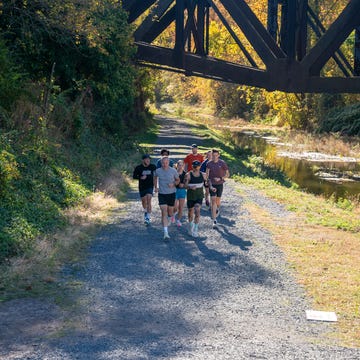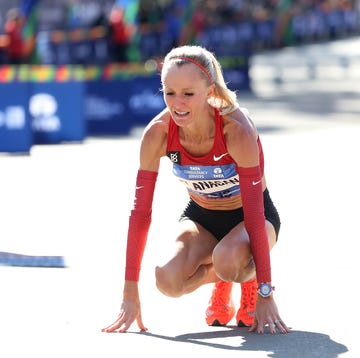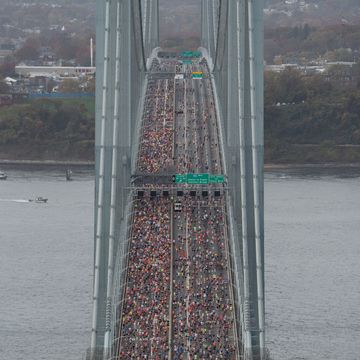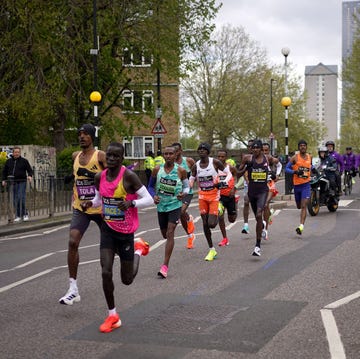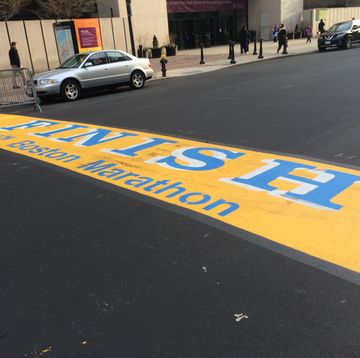A year later, the scene at the 26.2-mile mark remains as clear in Meb Keflezighi's eyes as the 60-some-odd photos he took in the minutes before the bombs went off.
He was standing on Boylston Street, near the finish of last year's Boston Marathon, enjoying a view an elite runner normally doesn't get to see: the rush of mid-pack runners crossing the line. "I never have a chance to be there, with media [requirements] and drug testing. We miss that," says Keflezighi, a two-time Olympic marathoner who was sidelined from the 2013 race with injuries. "I wanted to be part of it."
And he did what everyone does at the finish. For hours, he cheered on anonymous runners as they sprinted or shuffled across the famous yellow line. He urged them through their last steps. He says he could see from their faces who wanted to break 3:30, 3:35, 3:55.
He took time to look around. He saw people standing by the whipping flags outside the storefronts that line Boylston Street. He thought about walking over to stand with them soak in the sun as the afternoon cooled. He looked up at the buildings along the route, people watching the race from their windows while sipping something warm. "It was chilly. I wanted to have a tea," he remembers with a chuckle. And he kept taking photos of the people who ran on a day when he couldn't.
Then, just around 2:45 p.m. or so, he left to do a TV interview nearby. Five minutes later, two bombs exploded, turning a scene of enchantment into one of destruction.
"You are helpless," Keflezighi, 38, now says of the feeling that came upon him when told of the bombings. "All you can do is cry." And that's what he did.
As Keflezighi, and the world, would soon discover, the bombs that permanently marred the 117th running of the Boston Marathon killed three spectators, maimed dozens of others and left indelible memories on those there that day.
On April 21, the race returns to Boston's streets and so will many of those who were there a year ago. A field of 36,000 runners--the largest since the 100th running of the race--is expected to line up. Each runner will have a personal reason to get to Boylston Street, but it's unlikely any will run without last year's race in mind. Including Keflezighi. He's healthy; his sights are set on winning. If he does, he will be the first American man to do so since 1983. But that's not all that's pushing him. "Does it motivate me? Of course," he says of the tragedy of 2013. "It motivates me to do the best I can do with my life every day, because tomorrow is not guaranteed."
Others who are returning don't expect to win, but they do expect something more than a finisher's medal. Ginger Cross, 41, from Tucson, Ariz., is seeking closure. A 3:38:40 qualifier, she was visiting Boston for the first time, and with her husband, Eric, had seen the sights: a Red Sox game at Fenway, a visit to Cheers. "All I have to do now is run 26.2 miles," she told herself the night before the race, "and it will be one of the best memories I will ever have." But on race day, she found herself running in between the two bomb blasts. The first one exploded about 300 feet in front of her; she reversed course. Then came the second. "I was even closer to that one," she says. At that point she sprinted off the course.
She returned home, expecting never to run Boston again. The terror of the day stayed with her. "I didn't function for two or three weeks," she says. But slowly, the desire came back. She saw a therapist who told her that someday she would need "to close this chapter." Then her 11-year-old daughter said, "Mom, you didn't cross that finish line." Cross remembers simply saying, "Dammit!" and beginning to plot her Patriots' Day run. "I have goals," says Cross, who is hoping for a sub-3:30, "but this is going to be more of an emotional run than a physical run."
James Moon finished his race. In fact, stoked by the thrill of his first Boston, the Evergreen, Colo., runner headed straight to City Sports, a shop on Boylston Street, to get his medal engraved with his finishing time: 3:17:34. But as he left the store with his wife, Sunshine, the first bomb exploded. Moon, 47, says, "I thought it was fireworks." After the second explosion and the panic that ensued, the Moons found shelter in the stair-well of a nearby office building. They waited there, terrified. "I don't know how long," Moon says.
Eventually they made it to their hotel, and the next day, Moon worked his sore muscles by walking parts of Boston's Freedom Trail. "It was therapeutic," he says. "It put what happened the day before in perspective."
He's returning with plans to go under 3:10. In preparation, he's run his first ultra and upped his mileage from 44 miles a week to 75 miles. But the good time he seeks won't be recorded just on his watch. He's looking to celebrate, not hide, after his run. "I want to show my support for Boston and the running community and our country," says Moon, a father of two young children.
Amy Heredia, 45, has been training harder, too. She says she has been doing more speed work this year in anticipation of her third straight Boston. She wants to go sub-3:40. Heredia wants a 2-minute PR. That said, she'd be happy with a 1-second improvement. "[A PR] just makes a statement," says Heredia, who requalified last year by running a 3:50:46. "It will say, 'I am not going to let [the bombings] discourage me; I am not going to be afraid of being proud.' I just want to show they didn't win."
Heredia had finished her race and was in line for her bag when the bombs exploded. She left unharmed; the next day, she was on an early flight home to San Francisco. But she left with regrets. "I didn't want to leave Boston that way. It was hard to leave with all of it unresolved," she says. "You wanted to be part of the group that was holding people up."
Admittedly, Heredia has struggled at times since last April. Loud noises--even her coffee grinder--can be startling. Running has provided a calming influence. "It kind of eases the stress and fights off the bad endorphins and replaces them with good ones," Heredia says. "You feel like you are not going to let anyone mess with you or take away the joy you have come to expect."
On April 21, she'll once again set out in search of that sensation, along with 36,000 runners like her.


